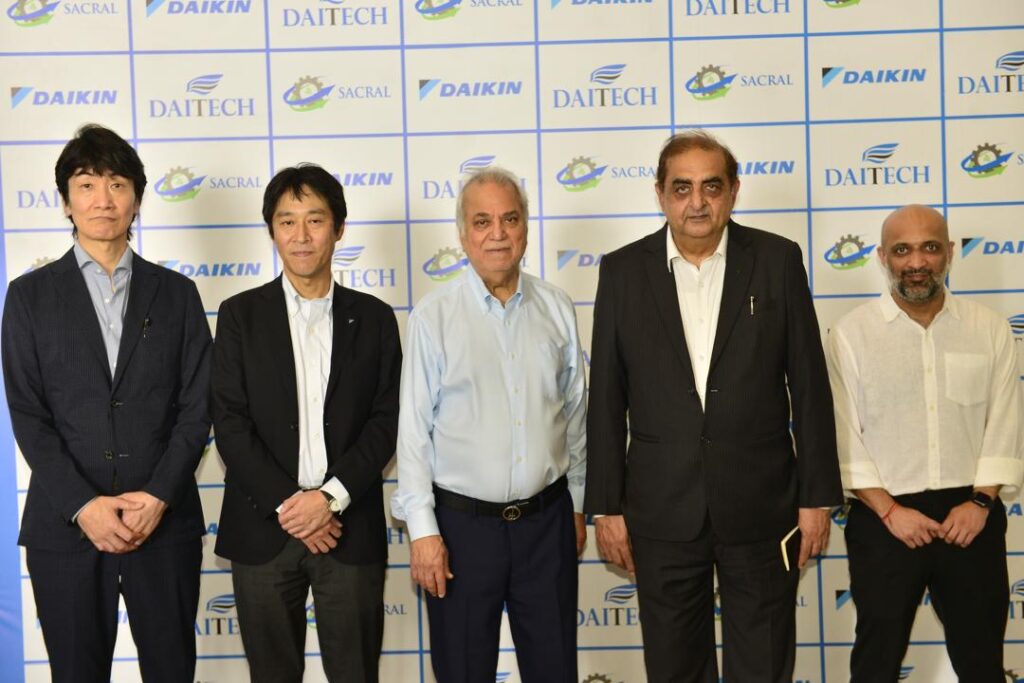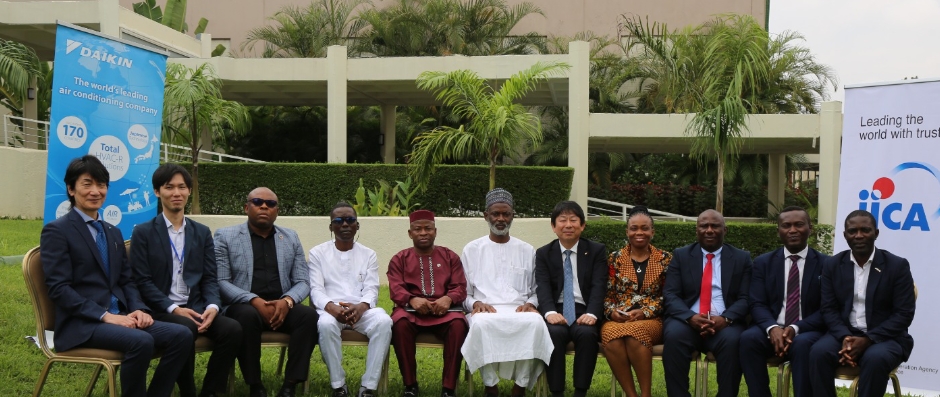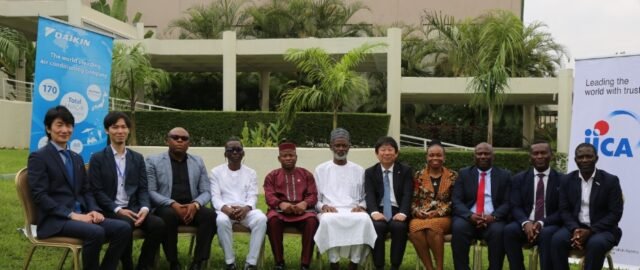In a move poised to change the narrative of climate impact and rising power consumption in Nigeria, Daikin Industries Ltd., in partnership with the Japan International Cooperation Agency (JICA), has officially launched a nationwide initiative. The programme centres on promoting the adoption of high-efficiency inverter air‑conditioners equipped with R32 refrigerants—a key strategy to curb greenhouse gas emissions and manage energy demand in the country.
The reveal took place at a well‑attended event in Abuja’s Continental Hotel. It marks a significant juncture in Nigeria’s energy transition, linking cutting-edge cooling technology with national climate goals.
Table of Contents

Why This Initiative Matters
Nigeria is grappling with surging energy demands across households, offices, and public facilities. Cooling systems alone represent a growing share of total electricity consumption. With forecasts from Nigeria’s Cooling Action Plan projecting an eightfold increase in air conditioner use by 2050—and electricity needs and greenhouse gas emissions expected to rise seven times over—the stakes are high.
Against this backdrop, inverter air‑conditioners using low‑GWP R32 refrigerants emerge as a compelling solution. Compared to standard non‑inverter units using older R22 refrigerants, these modern systems can cut energy use by 20% to 50%, as demonstrated in pilot tests in Lagos.
Technical Demonstration: Lagos Pilot Tests
Daikin conducted empirical trials in two locations across Lagos to validate the inverter AC’s performance. The tests compared an R32 inverter model with a conventional R22 non‑inverter unit, monitoring metrics such as:
- Electricity consumption
- Voltage and current draw
- Active power usage
- Indoor/outdoor temperature and humidity
Results showed that the inverter model consistently consumed significantly less power than its conventional counterpart, reinforcing its energy‑saving superiority.
Voices from Leadership: Commitment to Climate and Nigeria
At the launch, Junichi Omori, Executive Officer at Daikin Industries Ltd., reaffirmed the company’s pledge to achieve net‑zero emissions by 2050. He highlighted Nigeria’s strategic importance: a growing population, increasing economic activity, and the government’s drive for sustainable infrastructure. In his words:
“Nigeria is a country with ample potential in business … High‑efficiency air conditioners are essential devices to curb Nigeria’s surging energy demand and contribute to reducing GHG emissions.”
Echoing this, Susumu Yuzurio, JICA’s Chief Representative in Nigeria, emphasised Japan’s long‑term commitment to support the country’s energy reforms. He noted that the Daikin‑led pilot study extends beyond technology transfer—it reflects a broader scope for future socio‑economic collaboration between Nigeria and Japan.
“Improving the efficiency of energy use will contribute to reducing government costs and reducing emissions in society, and ultimately lead to the benefit of the people.”
Strategic Pillars: Environmental, Economic, Social Impact
This initiative rests on three primary pillars:
- Environmental sustainability: Accelerating the phase‑in of low‑GWP refrigeration systems and energy‑efficient compressors to reduce CO2 output.
- Economic relief: Lowering electricity bills for households and businesses, easing national energy infrastructure strain.
- Social benefit: Enhancing comfort and productivity while aligning with national climate targets and development goals.
In technical terms, inverter technology adjusts compressor speed dynamically, matching cooling output with actual demand, leading to substantial energy savings over the lifecycle of the unit—a model Daikin champions globally.

Nigeria at the Global Crossroads of Cooling Demand
Emerging economies like Nigeria show explosive projected growth in cooling needs. According to Daikin and global energy agencies like the IEA, the worldwide stock of air conditioners is set to triple by 2050, primarily across tropical and subtropical regions.
Given that Nigeria’s climate and urbanisation patterns mirror these trends, this JICA‑Daikin collaboration has the potential to define Nigeria’s energy‑efficiency trajectory in the decades ahead.
Daikin’s Environmental Credentials
Daikin Industries is recognised globally for its leadership in heating, ventilation, air conditioning and refrigeration (HVAC‑R). The company’s Environmental Vision 2050 outlines ambitious targets: to cut net greenhouse gas emissions by 50% by 2030, and achieve carbon neutrality by 2050, relative to a 2019 baseline.
Key technologies underpinning this vision include:
- Inverter compressors, which modulate cooling power gradually to avoid energy waste.
- Low‑GWP refrigerants, like R32, which significantly reduce climate impact compared to older refrigerants.
- Heat-pump systems, which harness ambient heat to deliver efficient cooling or heating as needed.
Daikin also offers its R32-related intellectual property royalty‑free to other manufacturers, encouraging broader adoption of low‑emission refrigerants.
What Lies Ahead: Deployment & Scale
As part of the initiative, JICA and Daikin intend to roll out a sensitisation and demonstration campaign across major Nigerian cities. The goal is to engage stakeholders from the private sector, public institutions, and the consumer market to accelerate the adoption of inverter cooling units.
The Nigeria Energy Commission, a key partner, has committed to supporting the programme’s dissemination and aligning it with national cooling action strategies.
Challenges & Opportunity Landscape
Challenges include upfront costs: inverter AC units are typically priced higher than standard models. Yet, when lifetime electricity savings are factored in, the total cost of ownership can be notably lower.
Nigeria’s inconsistent power supply and maintenance culture also present barriers, but these can be addressed through robust after-sales services and local capacity-building.
On the upside, the programme intersects with global funding interests in clean technology, climate resilience, and sustainable development. Organisations financing Nigeria’s energy transition—such as multilateral development agencies—may see inverter AC deployment as a viable intervention.
Consumer Story: Cooling Smarter, Living Better
Imagine a Lagos office equipped with a network of inverter‑based cooling units. Not only do energy bills shrink, but occupants notice faster temperature stabilisation, quieter operation, and improved ambient comfort. That’s the real‑life value of efficient HVAC technology, on top of national emission reductions.
By taking these steps now, households, businesses, and public service providers become proactive participants in climate action.
Overcoming Myths and Building Trust
There’s cautious optimism: while Nigerians welcome cost‑saving appliances, trust is key. Daikin’s brand reputation and JICA’s institutional backing offer credibility. The pilot test findings—delivered transparently in Lagos—lend further assurance of performance.
Educational efforts and demonstration sites will be critical to dispel doubts and show the savings potential in real time.
What to Expect Next
- Scaling demonstration trials: Beyond Lagos, cities like Abuja, Port Harcourt, and Kano may host further pilot installations.
- Policy dialogue: Coordinated talks with regulators to introduce efficiency standards or incentives for inverter ACs.
- Partnerships: Collaboration with Nigerian distributors, installers, and training centres to ensure technology adoption and after-sales support.
- Consumer awareness campaigns: Media outreach and seminars to explain benefits, installation guidance, and long-term value.

Conclusion
Daikin and JICA’s initiative is more than a corporate or diplomatic gesture—it’s a strategic blueprint for Nigeria’s energy‑efficient future. By integrating high-efficiency inverter AC systems with global climate goals and positioning them within accessible market frameworks, the programme bridges technology, economics, and environmental stewardship.
When schools, offices, and homes across Nigeria adopt inverter air‑conditioners, consumers may soon enjoy savings on electricity bills, improved comfort, and contribute to national emission targets. At scale, this initiative marks a pivotal chapter in Nigeria’s transition toward cleaner energy and efficient cooling infrastructure.
Join Our Social Media Channels:
WhatsApp: NaijaEyes
Facebook: NaijaEyes
Twitter: NaijaEyes
Instagram: NaijaEyes
TikTok: NaijaEyes





